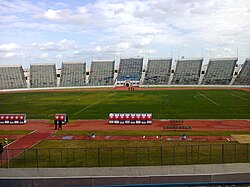Top Qs
Timeline
Chat
Perspective
1994 African Cup of Nations
International football competition From Wikipedia, the free encyclopedia
Remove ads
The 1994 African Cup of Nations, known as the Nescafé 1994 Africa Cup of Nations for sponsorship purposes, was the 19th edition of the African Cup of Nations, the biennial international men's football championship of Africa organised by the Confederation of African Football (CAF). The tournament was played between 26 March and 10 April 1994 in Tunisia, taking place in the country for the second time following the 1965 editions. Tunisia host the tournament, who replaced original hosts Zaire. The Zambian team was recently formed, following an air disaster in which eighteen players and several staff members of the previous team had been killed.
The defending champions were Ivory Coast from the 1992 edition. A total of 20 matches were played, in which 44 goals were scored, at an average of 2.2 goals per match. Attendance at all stages of the tournament reached 267,400, averaging 13,370 viewers per match. Qualification took place from 14 June 1992 to 24 October 1993. Ivory Coast as title holder and Tunisia as host country automatically qualified for the final phase of the tournament. As in the 1992 edition, twelve teams, divided into four groups each comprising tree teams, took part in the competition. Host Tunisia were eliminated from the group stage, which became the biggest failure in the history of the team. The defending champions Ivory Coast were eliminated in the semi-finals after losing in penalties against Nigeria.
Nigeria won the title for the second time in their history, after beating Zambia in the final match with a score of 2–1. Ivory Coast secured third place after beating Mali in the third place match, which placed them fourth. Nigerian Rashidi Yekini scored 5 goals at the end of the tournament, so he won the top scorer award, also he won the best player award. As champions, Nigeria qualified for the 1995 King Fahd Cup in Saudi Arabia, as a representative of African continent.
Remove ads
Teams
Summarize
Perspective
Ten tickets are to be distributed to the 37 countries participating in these qualifications. Tunisia, the tournament organizer, and the Ivory Coast, the defending champion, are exempt from these games. After a preliminary round played in two-way matches involving four teams (two qualified for the main round), the teams are divided into eight groups of four. The first in each group as well as the second in groups of 5 or 6 obtain their ticket for the final tournament in Tunisia. In addition to the withdrawals during the competition of Togo, Chad, Tanzania and Burkina Faso, the selections of Mauritania and Libya, initially registered, withdraw before the start of the qualifications.
Note for these qualifiers the debut in official international competition of the selection of Cape Verde, eliminated in the preliminary round, and the first participation of South Africa, banned from world football since the establishment of apartheid. The end of South Africa's segregationist policy allows the reintegration of Bafana Bafana into the CAF.
Qualified teams

The 12 qualified teams are:
- Notes
Remove ads
Squads
Venues
Group stage
Summarize
Perspective
Tiebreakers
If two or more teams finished level on points after completion of the group matches, the following tie-breakers were used to determine the final ranking:
- Greatest total goal difference in the three group matches
- Greatest number of goals scored in the three group matches
- Most points earned in matches against other teams in the tie
- Greatest goal difference in matches against other teams in the tie
- Greatest number of goals scored in matches against other teams in the tie
- Drawing of lots
Group A
Group B
Group C
Group D
Remove ads
Knockout stage
| Quarter-finals | Semi-finals | Final | ||||||||
| April 2 – Tunis | ||||||||||
| | 0 | |||||||||
| April 6 – Tunis | ||||||||||
| | 2 | |||||||||
| | 2 (4) | |||||||||
| April 3 – Sousse | ||||||||||
| | 2 (2) | |||||||||
| | 1 | |||||||||
| April 10 – Tunis | ||||||||||
| | 2 | |||||||||
| | 2 | |||||||||
| April 2 – Tunis | ||||||||||
| | 1 | |||||||||
| | 0 | |||||||||
| April 6 – Tunis | ||||||||||
| | 1 | |||||||||
| | 0 | |||||||||
| April 3 – Sousse | ||||||||||
| | 4 | Third place | ||||||||
| | 1 | |||||||||
| April 10 – Tunis | ||||||||||
| | 0 | |||||||||
| | 3 | |||||||||
| | 1 | |||||||||
Quarterfinals
Semifinals
Third place match
Final
Remove ads
Goalscorers
There were 44 goals scored in 20 matches, for an average of 2.2 goals per match.
5 goals
4 goals
2 goals
1 goal
 Hamza El-Gamal
Hamza El-Gamal Ayman Mansour
Ayman Mansour Prince Polley
Prince Polley Aboubacar Titi Camara
Aboubacar Titi Camara Tchiressoua Guel
Tchiressoua Guel Adama Koné Clofie
Adama Koné Clofie Ahmed Ouattara
Ahmed Ouattara Donald-Olivier Sie
Donald-Olivier Sie Abdoulaye Traoré
Abdoulaye Traoré Fernand Coulibaly
Fernand Coulibaly Amadou Diallo
Amadou Diallo Mobido Sidibé
Mobido Sidibé Soumaila Traoré
Soumaila Traoré Mutiu Adepoju
Mutiu Adepoju Ben Iroha
Ben Iroha Momath Gueye
Momath Gueye Athanas Tendeng
Athanas Tendeng Faouzi Rouissi
Faouzi Rouissi Lemba Basaula
Lemba Basaula Nsumbu Ngoy
Nsumbu Ngoy Kalusha Bwalya
Kalusha Bwalya Zeddy Saileti
Zeddy Saileti Evans Sakala
Evans Sakala
Remove ads
CAF Team of the Tournament
Goalkeeper
Defenders
Midfielders
Forwards
External links
Wikimedia Commons has media related to 1994 African Cup of Nations.
Wikiwand - on
Seamless Wikipedia browsing. On steroids.
Remove ads





